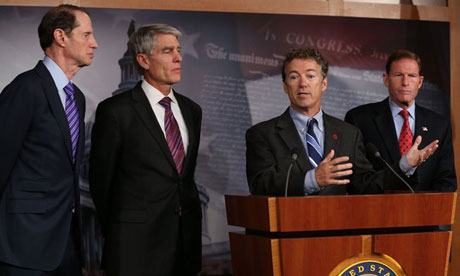
Rand Paul (third right) speaks at the unveiling of the NSA reform package on Capitol Hill. Photograph: Mark Wilson/Getty Images
Four senators at the vanguard of bipartisan efforts to rein in US government spying programs announced the most comprehensive package of surveillance reforms so far presented on Capitol Hill on Wednesday.
The draft bill represented the first sign that key Republican and Democratic figures in the Senate are beginning to coalesce around a raft of proposals to roll back the powers of the National Security Agency in the wake of top-secret disclosures made by whistleblower Edward Snowden.
"The disclosures over the last 100 days have caused a sea change in the way the public views the surveillance system," said Democratic senator Ron Wyden, unveiling the bill at a press conference alongside Republican Rand Paul.
"We are introducing legislation that is the most comprehensive bipartisan intelligence reform proposal since the disclosures of last June," he said.
Wyden said the bill would set a high bar for "not cosmetic" intelligence reform, on the eve of a series of congressional hearings into the NSA's surveillance powers that will begin on Thursday.
The two other senators supporting the bill were Democrats Mark Udall, a long-time ally of Wyden, and Richard Blumenthal, who has been at the forefront of efforts to reform the secretive court process that grants surveillance warrants.
Their bill, the Intelligence Oversight and Surveillance Reform Act, merges competing legislative proposals announced by the senators before the summer recess, and cherry-picks from ideas contained in about twelve other draft bills.
It would prohibit the NSA's bulk collection phone records of Americans under section 215 of the Patriot Act, the most controversial aspect of US surveillance revealed by documents supplied by Snowden to the Guardian.
The bill would also prevent a similar data trawl of internet communication records, which was stopped in 2011, and definitively close a so-called "backdoor" that potentially enables the NSA to intercept the internet communications of Americans swept up in a program protected by Section 702 of the of the Fisa Amendments Act.
There is limited, if any, support in Congress for limiting the NSA's ability of monitor or gather evidence on foreigners.
The bill fuses with a proposal originally made by senator Blumenthal, which aims to reform the foreign intelligence surveillance (Fisa) court, making the quasi-judicial process more transparent and accountable.
If made law, the act would require a "constitutional advocate" to be introduced into the opaque court process, so that the government could be challenged on privacy grounds in significant or precedent-setting cases. It would insert an adversarial dimension to a court process that is currently one-sided in favour of the government.
It also incorporates aspects of more than a dozen legislative efforts that surfaced in the wake of disclosures by Snowden, such as allowing technology companies to disclose how many court orders they receive for their users' data, and the strengthening a privacy watchdog.
President Obama pledged last month to work with Congress to "pursue appropriate reforms" to the government's surveillance programs. However, analysts are predicting the White House to pursue superficial reforms that might bring more transparency to the NSA and the Fisa court, but would stop short of clipping the wings of the intelligence community.
On Tuesday, the influential Senate judiciary committee chairman Patrick Leahy, who is bringing a similar bill to the one unveiled by Wyden, said the administration had failed to make the case that collection of phone records was "an effective counter-terrorism tool, especially in light of the intrusion on Americans' privacy right". Leahy said he was also considering reforms to the Fisa court. On Thursday, Feinstein's committee will hold a major congressional hearing into the various reforms under consideration. James Clapper, the director of national intelligence, and General Keith Alexander, the director of the NSA, are expected to argue hard against any diminution in their powers of surveillance. Earlier on Wednesday, Alexander criticised what he said was "sensationalised hype" and "media leaks" based on disclosures by Snowden, who has received temporary asylum in Russia. Alexander gave a specific defense of the mass collection of phone records, which looks most under threat in Congress, saying it enables the NSA to "join the dots" in major terrorist cases.
The appetite in Washington for reform of surveillance programs was made apparent in July, when a House of Representatives proposal to effectively end the NSA's bulk collection of phone records of millions of Americans was defeated by just 12 votes.
The amendment, brought by Republican Justin Amash and Democrat John Conyers, was strongly opposed by leaders of the two parties, the White House, and the intelligence establishment.
The fact it was only narrowly defeated revealed the depth of anger in some quarters of Capitol Hill over the perceived excesses of the NSA – and provided a glimpse of the potential strength of a House alliance between libertarian Republicans and left-leaning Democrats.
Wednesday's press conference – featuring leftwingers Wyden, Udall and Blumenthal alongside Paul, one of the most prominent libertarians in the Republican party – suggested those dynamics could be repeated in the Senate.
Wyden said the House vote in July was "a huge wake-up call", revealing the depth of opposition to government surveillance programs in the wake of Snowden's disclosures. Blumenthal said their bill represented a "coming together of a very diverse ideological elements of our respective parties".